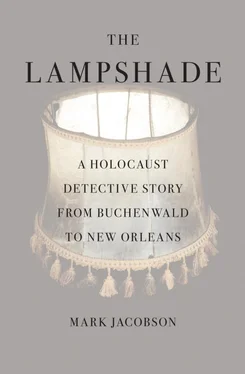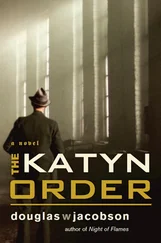The presence of Mayor C. Ray Nagin’s name on the side of the Bus, part of a complicated municipal takeover of the program, didn’t help. On one occasion an outraged citizen started banging on the door, demanding to talk to the mayor. His life in shambles since the storm, the man hadn’t received any of his promised state or federal relief and wanted to make sure the mayor knew of his frustrations. “I know he’s in there. It says so right there,” the man screamed, pointing to the mayor’s name on the vehicle. “Send that motherfucker out here! Right now! ” The Craigslist thing was also problematical, with several would-be job seekers saying, “List? You ain’t gonna put me on no list.”
Still, Skip forged ahead, testing the Bus’s loosely strung suspension system in the ruined sections of town, attending to those he called “America’s Least Wanted.” When I reached him with the news about the lampshade, Skip was returning from Gentilly, where the still-visible Katrina waterline ranged as high as ten feet in some spots. Skip listened to what Bob Bever had told me, then, barely audible, said, “Let me call you back.”
I didn’t speak to him again until the next evening. After hearing the news, he had immediately driven the Bus to its lot, locked it up, gotten in his car, and driven home, where he drank quite a bit of Jack Daniel’s and several beers. Then he went to his computer to retrieve a picture he’d downloaded of Masha Bruskina, a seventeen-year-old Byelorussian Jewish Communist partisan being hanged by a laughing Nazi SS officer, an image that had haunted him for decades. Skip stared at Bruskina’s dead face, impassive, unrelenting beneath the hair she’d bleached blond to pass as an Aryan, and began to weep. Then he stumbled into his living room and fell asleep on the couch. When he woke up several hours later, both his young daughters were perched on top of his prone body as if it were a bleacher seat as they watched an episode of SpongeBob SquarePants .
Getting up, Skip drove the five blocks to Piety Street, where Dave Dominici lived. Reaching through the padlocked iron gate, Skip knocked on the wood door, which bore a sign saying, “Trespassers will be shot, survivors will be shot again.” There was no response, so he knocked again, harder this time. He heard the sound of someone stirring, followed by a shout of “Identify!”
Being, as he later described himself, “pretty much out of my mind by this point,” Skip screamed, “It’s me! Skip. Remember me? I bought the lampshade!”
The door opened a crack. Dave Dominici’s face appeared, a New Orleans Saints fleur-de-lis skull wrap askew across his forehead. Dominici opened the door wider. He was wearing boxer shorts. In his hand, underneath a folded newspaper, Skip could see what he imagined to be the barrel of a large pistol.
It was late now, and there was no one around except for a couple of drunks exiting Markey’s Bar a block down Royal Street. “You remember me,” Skip said again. “The guy who bought the lampshade. You know, your neighbor. ”
A glimmer of recognition set in. “Oh… Neighbor! ” Reaching through the gate, Dominici opened the padlock. “Come on in, neighbor, ” he said, suddenly as friendly as can be.
The door opened into the kitchen which was lit by the glare of a single floodlight clipped onto a nail beside the refrigerator. Running around the room barking her head off was Dixie, Dominici’s shepherdlike mutt. A beige rug covered most of the kitchen floor. Dominici told Skip not to step on the rug because it was covering a four-foot-square, three-foot-deep hole in the floor.
“Don’t want to lose you, neighbor, ” Dominici said.
“That lampshade you sold me—remember that lampshade? It’s real! ”
Dominici looked out of it. Totally fried. He didn’t seem to have any idea what Skip was talking about.
This angered Skip. When he first got the lampshade, he entertained, for a moment, the notion that Dominici might be some kind of neo-Nazi, a rump follower of David Duke, Louisiana’s foremost fascist, who’d run for governor and senator a number of times back in the 1990s. Skip had met those freaks in the various jails where he’d worked trying to save the prisoners from themselves. But Dominici didn’t fit that bill. He looked like a hophead, not a Nazi, unless it was possible to be both at the same time, which Skip doubted in a place as lethargic as New Orleans. Still, you couldn’t just lay a human skin lampshade on a guy, along with all those sleepless nights, and then claim to have forgotten all about it.
“The lampshade—the damn lampshade,” Skip screamed, his ire dissolving to pleading incomprehension. “It’s made out of a person .”
Now Dominici was engaged. “A person?”
“A human being. They did DNA testing on it. In a lab. It’s human.”
“Human,” Dominici echoed, and began walking around the kitchen, stopping in front of the stove, where he squatted and placed his hands on his head as if trying to ward off a migraine. He stayed balled up like that for several seconds before catapulting himself forward, barely missing falling into the hole covered by the rug.
“I knew it. I knew it was Jew flesh!” he screamed.
It was not long before more came to light about Dave Dominici. As I would find out when I visited him at his Piety Street home, the hole in his kitchen floor now covered by a pair of nailed-down exterior doors. Dominici was something of a local celebrity. He was, as he said, “The famous cemetery bandit. The most hated man in New Orleans.”
Dominici opened a battered leatherette valise and pulled out a handful of creased clippings from the Times-Picayune . “These are all about me,” he said, with a salesman’s pride. There were two dozen or so articles, from 1998 up through 2002, with headlines like “A Grave Injustice,” “Stolen Artifacts’ Worth Could Run into Millions,” and “Cemetery Thief Pleads Guilty.” [9] Accounts of Dave Dominici’s career as the New Orleans cemetery bandit can be found in many Times-Picayune articles, from his arrest in February 1998 until the trial in March 2000. Short of Dominici’s own accounts, probably the most interesting and idiosyncratic rendering of the story is in Lost Souls in the Cities of the Dead (1st Books Library, 2001), “a fictional police mystery novel” self-published by New Orleans Police Department detectives Lawrence Green and Frederick Morton, the arresting officers in the case. As Morton, who is now an NOPD captain in charge of the evidence and property room, told me, the book was started by his late partner, who saw it as “a chance to get a lot of things off his chest about the job and his relationship with his father.” When Green abandoned the project, Morton took over and wrote the second half, which contains the cemetery bust. “I really jazzed it up,” said Morton, an outgoing individual who promotes mixed martial arts cards on the side and maintains an abiding interest in New Orleans prosecutor Jim Garrison’s investigation into the Kennedy assassination. According to Morton, the cops “kind of felt sorry for Dominici,” who is called “D’Angelo” in Lost Souls in the Cities of the Dead. “He really got the short end of the stick in all that with the art dealers,” Morton said. “But what can you expect? Dominici is a total potatohead.”
The story was this: In February 1998, a groundskeeper at the Lake Lawn Metairie Cemetery, one of New Orleans’s celebrated “cities of the dead,” from which a large number of decorative statues, brass urns, and benches had been disappearing, spotted what he termed “a suspicious-looking Chevy van with white curtains” moving slowly along the narrow roadways between the graveyard’s rococo tombs. The groundskeeper noted the van’s license plate and called the police. The vehicle was traced to one Carl Campo, the twenty-six-year-old son of a St. Bernard Parish handyman. After some questioning by New Orleans police detectives, Campo confessed his part in a cemetery robbery gang, fingering Dave Dominici as an alleged “ringleader” in what Times-Picayune columnist Chris Rose, writing in People magazine, called “a gothic netherworld of crime and greed involving people on all levels of Big Easy society, from petty criminals to the beau monde .”
Читать дальше












